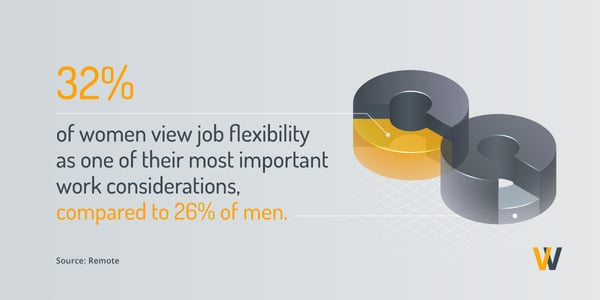Women belong in the (distributed) workforce
 Carlos N. Escutia
Carlos N. Escutia
In Kim Ji-young, Born 1982, author Cho Nam Joo depicts the life of a young woman and the everyday sexism she has experienced since birth. At home, when her parents favored her younger brother, at school, as a victim of sexual violence, and at work through the gender pay gap.
I remember reading that book and thinking it was all too similar to what I had experienced or the stories I heard from friends. As women, we are used to not being taken seriously, being denied promotions despite proving to be more than deserving, or even having to listen to awkward conversations (about other women) between male coworkers. Most of the time, this happens in the shadows, and, as the story's protagonist, women who go through these situations are considered unremarkable.
Traditionally, work has taken place in the office, where most of these stories stem from. The physical office is plagued by horror stories of people undermining women’s achievements. Although progress has been made, there’s still a long way to go to improve conditions for women.
Women in the workforce earn less than men, experience more harassment and microaggressions, and are less likely to reach the highest levels of their careers. Female employees also face challenges that men usually avoid, like childbirth and childcare. Additionally, women are underrepresented in leadership positions.
However, the shift to flexible work arrangements brought by distributed work is proving to be a way forward in leveling the playing field for women.
The case for flexibility
At the end of Kim Ji-young, Born 1982 –spoiler alert– a woman quits her job as a secretary at the main character’s psychiatrist's office because she gets pregnant. The funny thing is that the psychiatrist notes to himself he should hire an unmarried woman next so he doesn’t have to face the same problem.
It’s a textbook case of unconscious bias. Also known as implicit bias, it describes the judgments or decisions people make based on prior experiences, thought patterns, assumptions, or interpretations without being aware that they are doing it. The irony in the book is that, before making that remark, the psychiatrist empathized with the main character’s struggles.
According to McKinsey, microaggressions are a form of everyday discrimination that is rooted in bias, including subtle comments and actions that demean or dismiss someone based on their gender, race, or other aspects of their identity. Although subtle, they have a lasting effect on women’s careers and health due to the stress they cause.
The Women in the Workplace report by McKinsey highlights that women who experience microaggressions are less likely to feel psychologically safe, which makes it difficult for them to take risks, suggest new ideas, or raise concerns. What’s more, they tend to self-shield to deflect microaggressions, leading them to be three times more likely to think about quitting their jobs and four times more likely to almost always be burned out.
That same report states that women who work remotely experience fewer microaggressions and feel more psychologically safe in their work environment. In that sense, hybrid or distributed work means more than just a flexible schedule for women; it means improved work satisfaction.

Remote’s Global Benefits Report shows that 32% of women view job flexibility as one of their most important work considerations, compared to 26% of men. Women also value sick leave, paid holidays, and parental leave as essential benefits at a higher rate than men, who place a higher value on bonuses and severance pay.
Regarding career advancement, remote and hybrid options are better for women. According to the Pew Research Centre, women are about twice as likely as men to say that working from home made it easier for them to advance in their careers, with 19% compared with 9%. Additionally, 51% of women said working from home made it easier for them to finish their work and meet deadlines, while only 37% of men said the same.
The pandemic proved that women could balance their personal lives without compromising their ambitions and career goals. So, more women are rejecting the outdated idea that work and life are incompatible.
Remote work has made more jobs family-friendly, especially for working mothers. Occupations in traditionally flexible sectors such as education and pharmacy remained unchanged. However, family-unfriendly fields like finance and marketing narrowed their motherhood employment gaps.
The benefits of a gender-diverse workforce

Women are not the only ones who benefit from flexibility. When companies adopt hybrid or distributed arrangements, they can attract a more diverse workforce, including people who may have previously been unable to work due to geographical or other constraints.
Ensuring gender diversity in the workplace means equal representation for people of all genders—including men, women, transgender, and non-binary individuals. This diversity can bring a wealth of new ideas and perspectives to the company, leading to greater creativity and innovation. Here are just a few benefits that having more women in the workforce can bring to companies.
Increased profitability
Increasing the number of women in managerial roles not only addresses gender equality but also brings financial advantages. Research indicates that closing the gender gap could increase the global GDP by $5.3 trillion. Moreover, companies with higher female representation, especially in C-Suite positions, exhibit improved profitability, with the most gender-diverse firms being 25% more likely to experience above-average financial performance.
Effective leadership
The Harvard Business Review highlights that women in managerial positions outscore men in key leadership qualities. Female leaders are positively perceived by employees and provide better emotional and psychological support.
Enhanced team collaboration
Women contribute significantly to team collaboration by excelling in nonverbal communication skills. Research shows that groups with more women tend to be better at taking turns in conversations, maximizing the team's combined knowledge and skills. These social skills benefit collaboration in both in-person and virtual project settings.
Change and innovation
Increasing gender equality positively impacts innovation outcomes. Companies with female directors and gender-diverse teams led by women in top management show greater success in innovation, producing 20% more patents on average.
Leveling the playing field for women in the workplace

Kim Ji-young, Born 1982, sparked both outrage and a feminist wave in South Korea, a country with the highest gender pay gap among OECD members. That is to say that addressing everyday microaggressions can bring about a positive change.
Companies wishing to improve conditions for women must intentionally create structures that can make them thrive. For instance, they can focus on five main areas: flexibility, rethinking the work week, providing support and mentoring, addressing microaggressions, and removing bias.
1. Make flexibility the norm
As we’ve already covered, women consider flexibility one of the most important job considerations. The flexible approach accommodates diverse work preferences and allows women to work where they are most comfortable. Companies that can adopt these approaches can attract talented individuals and enjoy the benefits of having a diverse workforce.
2. Rethink the working week
Although companies offer four-day workweeks, women end up working for five days due to a higher workload or increased responsibilities. The best approach would be for employers to regularly check in with their employees to understand what works best for them and reassess their workload. By doing so, employees can structure their work and home life with a hybrid model, enabling them to achieve continued career success.
3. Support and mentor women
Businesses can benefit significantly from the perspectives and insights of women leaders and can use this knowledge to address the challenges faced by other women within the organization. Initiatives aimed at supporting and mentoring women are crucial in helping them rise through the ranks and achieve their career goals. By breaking down barriers and providing mentorship, education, and networking opportunities, organizations can create a more inclusive environment that benefits everyone involved.
4. Address microaggressions directly
In order to establish a respectful and inclusive workplace, it is essential to take a clear stance against microaggressions and disrespectful behavior. This can be achieved through strong leadership and a well-defined code of conduct. It is also important to educate employees on identifying and addressing microaggressions. Regular and high-quality bias training and allyship training can be incorporated. Creating a culture where employees feel comfortable discussing microaggressions is critical. This will allow for valuable learning and growth while promoting a safe and comfortable work environment for everyone.
5. Remove bias as a blocker for growth
Despite progress in board representation, challenges persist in appointing women to leadership positions below the board level. Companies can lead initiatives that incentivize female employee promotions to achieve gender balance and eliminate unconscious bias. By regularly reviewing recruitment processes, companies can emphasize gender equality in shortlisting and panel representation, increasing the number of women in senior roles.
Wrapping up
Achieving gender equality requires consistent and conscious effort. Companies must prioritize flexibility, mentoring programs, and fair compensation to achieve this goal. However, these efforts will only be successful if they are supported by the company's commitment to diversity, equity, and inclusion. Gender bias mustn't hinder talent and success.
I hope for a day when all women can feel safe and confident in their workplace, knowing that they will be respected and valued for their contributions. They should be able to make their own choices about their careers so they can achieve their goals and reach their full potential. Talent and success should not be bound by gender bias.






